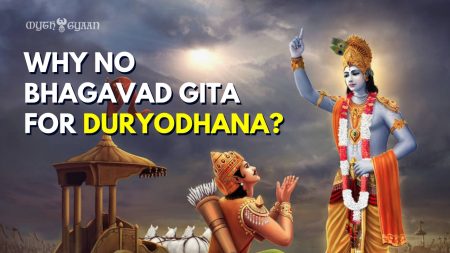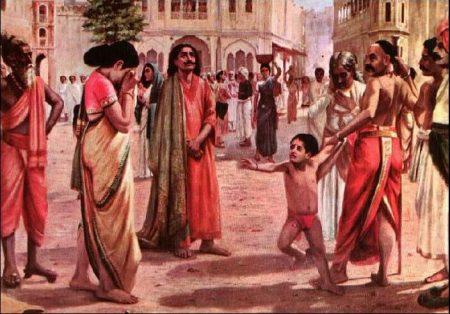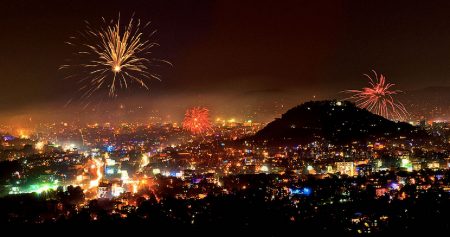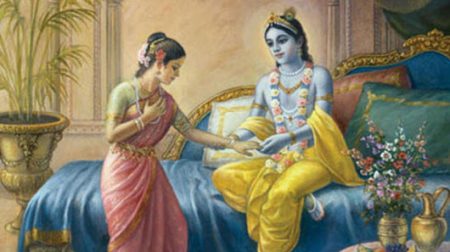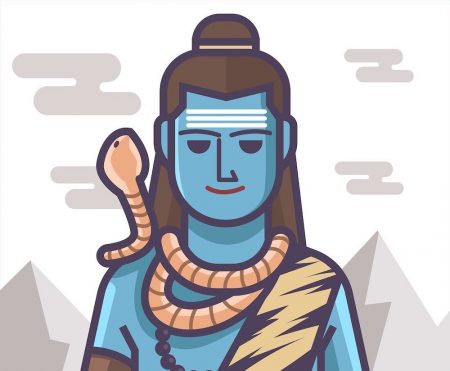Why Bhishma and Parashuram fight with each other in Mahabharata? Parashuram is the guru of Bhishma, then why Bhishma and Parashurama fight?
Before delving into the details of the fight, reason of Bhishma and Parashuram fight and what happened after the fight, let’s see some background about them in short.
Table of Contents
Bhishma Pratigya:
Bhishma means terrible and Pratigya means oath. Devavratha (later came to be known as Bhishma) is the eighth son of King Shantanu and his wife Goddess Ganga.
Ganga left Shantanu, after some time, he again fell in love with the daughter of the chief fisherman. But her father, Matsyagandha refuses the proposal of Shantanu marrying her daughter Satyavati (adopted).
He told Shantanu that he is afraid that her daughter’s children and their descendants will never be able to become king because Devavratha is his eldest son. Therefore he and his descendants will always claim the throne.

Shantanu becomes sad hearing this. Seeing this, Devavratha took the vow of lifelong celibacy and that he will not become the king. He told the father of Satyavati that he will not claim the throne. Also, he remains unmarried lifelong so that also his descendants would never claim the throne as they will never take birth.
Devavratha came to be known as Bhishma when he took this Bhishma Pratigya (or terrible oath) of lifelong celibacy. This vow becomes the basis or reason of Bhishma and Parashuram fight which we see in the upcoming section.
Also, this decision of Bhishma to remain in celibacy and not having children by any means is one of the reasons of the war that happens between Pandavas and Kauravas in Kurukshetra.
Because of Bhishma, Shantanu is able to marry her Satyavati. So he granted the boon of Ichcha Mrityu (control over his own death) to Bhishma.
Now Bhishma is able to choose the time of his death making him immortal till his chosen time of death. But he is not completely immortal.
The abduction of Amba, Ambika and Ambalika:
Eventually, Satyavati gave birth to two sons, Chitrangada and Vichitravirya. After the death of Shantanu, Chitrangada becomes the king of Hastinapur but for a short period of time. A Gandharva namesake (of the same name) in a fight kills him.
Vichitravirya becomes the king of Hastinapur after Chitrangada. Bhishma is searching for a suitable for his half-brother, Vichitravirya. Meanwhile, he heard of Swayamvara held by the King of Kashi for his daughters Amba, Ambika, and Ambilika.
Swayamvara, in ancient India, is the practice of choosing a husband, from among a list of suitors, by a girl of marriageable age.
But no invitation of Swayamvara is sent to Vichitravirya. Bhishma is offended by this action as he thought of it an affront to the dignity of his household.

So Bhishma went to Kashi to win those princesses for Vichitravirya. He kidnapped the three princesses. The kings present there tried to stop him but he has defeated them all and brought back the three princesses to Hastinapura.
This is going to become an important reason in Bhishma and Parashuram fight with each other.
Upon reaching Hastinapura, Amba told Bhishma that she is in love with Salwa (Shalva), the ruler of Saubala, who was also present in the Swayamvara.
After knowing this, Bhishma sends Amba to Salwa so that she could marry her. But Salwa refuses to accept her saying that she has been abducted by another man and then returned as a charity.
Saddened and humiliated Amba goes to Vichitravirya, but he also refuses her saying ‘What is once given is never taken back.’
After being rejected by Salwa and Vichitravirya, she approached Bhishma and demanded him to accept her as his wife. She told him that he abducted her because of which nobody is accepting her.
Bhishma rejects his demand citing his vow of lifelong celibacy. She was devastated by his actions.
Before Bhishma and Parashuram fight:
Enraged Amba takes the vow to avenge herself against Bhishma even if she has to reborn over and over again.
Parashuram unwilling to fight with Bhishma:
She went to his guru Parashuram to help her in killing Bhishma. Parashuram is one of the most fierce warriors and sage. He is considered to be the sixth avatar of Lord Vishnu. He even beheads his mother, Renuka.
But Parashuram is unwilling to take any action because of two reasons.
Bhishma said, ‘O Lord, repeatedly urged by that maiden to slay Bhishma, Rama replied unto that weeping girl, saying, ‘O daughter of Kasi, O thou of the fairest complexion, I do not, on any account, take up arms now except for the sake of those that are conversant with the Vedas. Tell me, therefore, what else I can do for thee? Both Bhishma and Salwa are, O princess, exceedingly obedient to me. Do not grieve, I will accomplish thy object. I will not, however, O beautiful lady, take up arms, except at the command of Brahmanas. This hath been my rule of conduct.’ – Udyoga Parva – Section CLXXX, p.344
One, Bhishma is his student. And secondly, Parashuram vows to not to take up arms expect for those who are acquainted with the knowledge of Vedas.
Parashuram agrees to confront Bhishma:
..Rishi (Akritavrana) of highly virtuous soul said these words,… Thou hadst further promised that as long as thou wouldst live thou wouldst not abandon those that would come to thee in fright and seek thy protection, and that thou wouldst, O Bhargava, slay that proud warrior who would vanquish in battle all the assembled Kshatriyas of the earth! O Ram, even Bhishma, that perpetuator of Kuru’s race, hath achieved such success (over all the Kshatriyas)! Approaching him, O son of Bhrigu’s race, encounter him now in battle!’ – Udyoga Parva – Section CLXXX, p.344
In the meantime, sage Akritavana reminded Parashuram that he also vowed not to abandon anyone who came to him for help and also kill that warrior who defeats all the assembled Kshatriyas of the earth in the battle.
Since Bhishma in the process of abducting the princesses defeats all the kings present there. This enables Parashuram to take up arms against Bhishma.
Bhishma and Parashuram fight:
Parashuram along with other priests and Amba reached on the banks of river Saraswati. He sends a message to Bhishma that he had arrived and asked him to come there. Bhishma is filled with joy as he is going to meet his master.
Parashuram asked Bhishma to marry Amba:
Parashuram asked Bhishma to marry Amba and take her responsibility. As it is because of Bhishma that she has been dissociated from virtue.
Nobody is going to marry her now because of Bhishma as he abducted her on the occasion of Swayamvara and dismiss her subsequently.
O Brahmana, I cannot, by any means, bestow this girl on my brother. O thou of Bhrigu’s race, it was to myself that she said, I am Salwa’s! And it was by me that she was permitted to go to Salwa’s city. As regards myself, even this is my firm vow that I cannot abandon. – Udyoga Parva – Section CLXXXI, p.345
Bhishma disobeys Parashuram:
But Bhishma told Parashuram that he cannot bestow Amba on his brother by any means. Also he himself cannot marry her as he is bounded by his vow of lifelong celibacy.
The renunciation is sanctioned by the ordinance of a preceptor who is filled with vanity, who is destitute of the knowledge of right and wrong, and who is treading in a devious path. Thou art my preceptor and it is for this that I have from love reverenced thee greatly. Thou, however, knowest not the duty of a preceptor, and it is for this that I will fight with thee. I would not slay any preceptor in battle, especially again a Brahmana, and more especially one endued with ascetic merit. It was for this that I forgive thee. It is a well-known truth, gatherable from the scriptures, that he is not guilty of slaying a Brahmana who killeth in battle a person of that order that taketh up weapons like Kshatriya and fighteth wrathfully without seeking to fly. – Udyoga Parva – Section CLXXXI, p.346
Despite being his disciple, Bhishma refused claiming that “the renunciation of the preceptor is sanctioned by the ordinance of a preceptor who filled with pride. I will not kill you in the battle. Knowing the fact from the scriptures that One is not guilty of killing a Brahmin in a battle who has taken up weapons like a Kshatriya.”
He invited Parashuram for a battle in Kurukshetra, the future site of the Mahabharata war. This is how Bhishma and Parashuram fight started.
Bhishma and Parashuram fight started:

Bhishma came in the war wearing armour on his mighty car (ratha). He also demanded Parashuram to mount on a car but Parashuram said that Earth is like his car and Vedas are like good horses that carry him.
Rama smilingly replied unto me on that field of battle, saying, ‘The Earth, O Bhishma, is my car, and Vedas, like good steeds, are the animals that carry me! The wind is my car-driver, and my coat of mail is constituted by those mothers in the Vedas (viz., Gayatri, Savitri and Saraswati). Well-covered by these in battle, O son of Kuru’s race, I will fight!’ – Udyoga Parva – Section CLXXXII, p.349
Bhishma and Parashuram started fighting with each. They both are using weapons of equal power and neutralised each other’s weapons.
While Bhishma uses weapons like Vayavya and Agneya, Parashuram neutralised these with his weapons like Guhyaka and Varuna.
…And night came with its delicious and cool breezes, and then both of us desisted from the fight. In this way, O king, when evening came the fierce battle ceased, and (next day) with the re-appearance of the sun it commenced again. And it lasted for three and twenty days together. – Udyoga Parva – Section CLXXXV, p.356
Bhishma and Parashuram fight continued for 23 days:
They fight between sunrise and sunset and then ceased the fight until the next day. This Bhishma and Parashuram fight lasted for 23 days.

Bhishma has tried all his powers and weapons but was unable to defeat Parashuram in the battle. So he prayed to the gods to help him and show him the path of victory while he is asleep.
…This beloved weapon, O Bharata, called Praswapa, appertaining to the lord of all creatures, and forged by the divine artificer, will come to thy knowledge, for it was known to thee in thy former life! Neither Rama nor any person on earth is acquainted with it. – Udyoga Parva – Section CLXXXVI, p.356
Gods appear in his dreams and told him that they would give him the knowledge of the weapon called Praswapa or Prashwapastra.
They said, “Neither Parashuram nor anyone else is acquainted with the knowledge of this weapon”. Bhishma is able to acquire the knowledge of it as he has possessed this weapon in his previous birth.
They also told him that he is not able to kill Parashuram with this weapon. By using this, Parashuram will fall asleep and then Bhishma can vanquish him and then will awake him using another weapon called Samvodhana.
Then the next day, Bhishma and Parashuram fight resumed. Suddenly the mantras for invoking the Praswapa weapon came into the mind of Bhishma. But when he tried to use it, Narada and other gods came and stopped him.
Bhishma and Parashuram fight stopped:
When I had aimed it, Narada addressed me, saying, ‘Yonder, O Kauravya, stay the gods in the sky! Even they are forbidding thee today! Do not aim the Praswapa weapon! Rama is an ascetic possessed of Brahma merit, and he is, again, thy preceptor! Never, Kauravya, humiliate him.’ While Narada was telling me this, I beheld those eight utterers of Brahma stationed in the sky. Smilingly, O king, they said unto me slowly,–O chief of the Bharatas, do even what Narada sayeth. Even that, O best of Bharata’s race, is highly beneficial to the world!’ I then withdrew that great weapon called Praswapa and invoked according to the ordinance the weapon called Brahma in the combat. – Udyoga Parva – Section CLXXXVIII, p.358
Narada told him to not to use this weapon against Parashuram. Because first, he is an ascetic possessed of Brahma merit and second, he is your guru. Do not humiliate him with this weapon. Parashuram sees Bhishma withdrawing his Parswapa weapon, he immediately declared, “I am vanquished (defeated)”.
And shortly after that Parashuram is approached by the spirits of his ancestors, who similarly told him to stop fighting. They told Parashuram that to fight is the duty of a Kshatriya. Also, Bhishma is destined to be defeated by Arjuna, son of Indra. His duty as a Brahman is to study Vedas and to practice his vows.
Parashuram surrendered to Bhishma:
Parashuram agreed to put down his weapons and surrender to Bhishma. Thus finally Bhishma and Parashuram fight stopped completely.
Rama said, ‘O damsel, in the very sight of all these persons, I have fought according to the best of my power and displayed my prowess! By using even the very best of weapons I have not been able to obtain any advantage over Bhishma, that foremost of all wielders of weapons! I have exerted now to the best of my power and might. O beautiful lady, go whithersoever thou wishest! What other business of thine can I accomplish? Seek the protection of Bhishma himself! Thou hast no other refuge now! – Udyoga Parva – Section CLXXXIX, p.360
He told Amba that “he is unable to defeat Bhishma in the battle, in spite of using best of his power and weapons. Also, Bhishma was the one she should seek refuge in as she has no other refuge now”. Amba told Parashuram that:
As regards myself, I will not go a second time to Bhishma. I will, however, O perpetuator of Bhrigu’s race, go thither, O thou endued with wealth of asceticism, where I may (obtain the means to) myself slay Bhishma in battle!’ – Udyoga Parva – Section CLXXXIX, p.360
Amba engaged in Tapasya (deep meditation):
But Amba was keen on seeking revenge. So she engaged in Tapasya (deep meditation) until Shiva appeared before her, and she asked that she be reborn as a man so that she could kill Bhishma.
Shiva granted her the boon, saying:
The words I have uttered cannot be false. O blessed lady, true they will be. Thou shalt slay Bhishma and even obtain manhood. Thou shalt also remember all the incidents (of this life) even when thou shalt obtain a new body. Born in the race of Drupada, thou shalt become a Maharatha. Quick in the use of weapons and a fierce warrior, thou shalt be well-skilled in battle. O blessed lady, all that I have said will be true. Thou shalt become a man at the expiration of some time (from thy birth)!’- Udyoga Parva – Section CXC, p.363
Shiva told her that “You will be reborn as the daughter of King Drupada and remember everything from your past. And as per the boon, you will become a man after some time from birth and play an instrumental role in the death of Bhishma“.
Amba immediately jumped into a fire. She was reborn as Draupadi’s sister Shikhandini and in the later stage of her life attain sex change and become Shikhandi.
Shikhandi was instrumental in Bhishma’s death because he was unwilling to fight someone who had been a woman in her past life.


